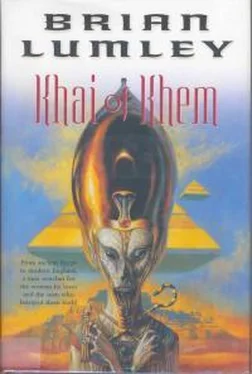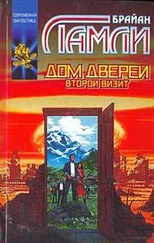“Ten million?” Khai gasped in his dream. “There are not so many fighting men in all Khem, Arabba and Therae together!” “Men, no,” answered the brown mage. “Rats, yes!” “Rats?” Genduhr Shebbithon growled. “Rats?”
“Rats, yes—bearing a plague brought up from the depths of hell—for whomever these rats bite, he shall die on the spot, consumed, gone down in liquid corruption!”
“When, where will they strike, these rats?” Manek asked, hand on sword hilt.
“They come now,” answered the mage, “from the Nile. You must get up at once, all of you, and build fires—a wall of fires from the north to south, wherever your men are camped—to drive the rats back whence they came.”
“Fire?” Khai frowned. “But what of the wind? What little wind there is this night, it blows outward from Khem!”
“Faith, Khai,” the brown mage answered with a smile. “Have faith. Trust in the Mage of Elementalism, who sends a wind even now from the hills of Kush.”
Even as he spoke, the hill on which they all stood seemed to whirl beneath Khai’s feet, to dwindle, shrink away; or else he himself was lifted up in a giant’s hand and borne swiftly aloft… to be dumped down on his bed in a tent in the forest.
He awoke with a cry in the night, stumbled from his tent shouting hoarse-voiced orders, roused up his men in a frenzy as he rushed from tent to tent and sent other messengers to do his bidding. Then, east of the camp, he himself set the first fire, and as the forest began to blaze, so there came the first stirrings of a wind from the west, a mournful wind that played with the leaping flames and blew them north and south, set them jumping from tree to tree until Khai and his army drew back in fear. Then, as the wind strengthened, it hurled the fire eastward in a blaze that lighted up the land with a light bright as day.
And it was then that Khai saw the rats and knew that his actions had been just in time. The rats were there, in the fire, blazing as they came through the inferno, flashing into flame as they tried to breach the burning barrier and get at the men where they stood unharmed behind the fiery wall. Some did get through, driven on by the magic of the Dark Heptad, but very few. Bundles of smouldering fur they were, scampering and shrieking, and when they bit—
Khai stood near a man thus bitten, saw him crush the life from the smoking rat before he fell—then saw the flesh melt and slough from his body and the bones come through as all else turned to stinking rot!
“Kill them!” he roared then, snarling his fear and horror. “Kill any rats that break through, but don’t let them bite you!”
The tale was retold in the hills west of Asorbes, where Genduhr Shebbithon sent fire roaring eastward to destroy the gray horde that rushed squealing out from the heart of Khem; and on the savannahs north of the Nubian forests where Manek was now camped; so that the morning sun rose on a scene of black, smouldering desolation. In the north, along a front eighty miles long, it was as if a mighty architect had drawn a straight line—to the east of which, even to the banks of the Nile, all was blackened earth. Likewise in the south, where morning found Manek Thotak gazing east across a wasteland of ashes. In Peh-il, the Khemites had seen the fire coming, had made fire-breaks and flooded irrigation ditches, and by some miracle, they had survived both the furnace and the surviving, fleeing rats; but all else was burned. West of Asorbes itself only the swamps had stopped the blaze, but even the swamps were now little more than vast beds of cracked and dried-out mud.
And so the seven mages overcame the black magic of Pharaoh’s Dark Heptad … for the time being.
As Khai drove on Mylah-Ton—which only the surrounding swamps had saved from the inferno—and as his chariots and men cut a giant swathe through ashes of wasted forests all along the borders of dead swamps, so the Siwadis crossed the river below the delta and headed east into Syra. The Syrans, themselves oppressed for generations without number, took up arms and joined them, pushing southeast for Arabba.
In the south, Manek Thotak took Peh-il and turned north along the river, while to the east of the Nile, N’jakka’s impis marched on Phemor. The Theraens—in the main, a cowardly folk—had already retreated into their hills above the NarrowSea, for they had sensed that Khem’s days were numbered and they wanted no more of liaisons or friendships with Pharaoh. And eighty miles west of Asorbes, Genduhr Shebbithon camped his forces in a vast semicircle at the foot of the hills and gazed east in the direction of Khasathut’s capital. There, like a great cat lying in wait, he licked his lips in dreadful anticipation.
Ohath fell to Khai and he crossed the river to take Béna, and wherever Khem’s soldiers were found, they fell in their thousands; and those who did not desert Khem and flee before the iron invaders were driven back to their country’s heartland. Eight days after the Great Fires, Phemor fell to the Nubians and Pharaoh was now ringed in by the enemy’s forces. Even then he could have fled east—but where to? The NarrowSea would eventually stop him, and then he would be trapped between the water and the pursuing tribes of Rush. No, it would be a better plan to remain here and defend Asorbes, which was thought to be impregnable as the east-facing wall of the Gilf Kebir itself.
Moreover, there had been signs. Signs which told Khasathut he should remain at Asorbes. Shortly after the attack of the Kushites there had been green horizons at dawn and orange horizons at night, and the legends said that just such twilights had been seen before the advent of the God-peoples from the skies. Also, the Dark Heptad had warned that their supernatural experiments were taking them very close to the Great Source of all Knowledge, which was also the source of all evil. They might yet give Khasathut the immortality he so avidly desired, and in so doing, give him ultimate power over all men and creatures. The price, as he understood it, would be the Sanity of the Universe, but to Pharaoh that seemed a very small price indeed….
And so, with Khasathut’s blessing, the Dark Heptad continued with their occult experiments and plotted second and third terrors to hurl against the encroaching Kushites; and the more they worked their dark wonders, the easier it became to commune with the Powers of Evil, the closer those Powers drew to them in their gloomy chamber beneath the great pyramid.
As for Pharaoh: he was in a constant rage and continually issued threats against anyone who strayed too close to him. Anulep now spent all of his time placating, pleading and promising, and in hurrying about his master’s business: either conveying Khasathut’s commands or inquiries to his Dark Heptad or hi, military commanders, or carrying their answers or tremulous excuses back to the God-king.
And so things stood when, not thirty miles away, the General Kha, Ibizin took Wad-Gahar above the cataract—
Wad-Gahar….
The name struck a chord in Khai’s memory, but the note was elusive and soon forgotten in the face of more important things. The taking of Wad-Gahar was easy, for Pharaoh’s regular forces had been drawn back into a circle about Asorbes and they had left the protection of the town to ten thousand Theraen mercenaries. These had literally “occupied” the town, for being what they were Wad-Gahar’s rightful inhabitants had been more at their mercy than under their protection.
Their “protection,” indeed—the protection of Theraens!
Khai killed every last one of them, though that meant digging half of them out from their hiding-holes. And when the old people of the town (for there were only very old people and very young children left) saw that the Kushites would do them no harm, they very soon began to show the invaders just exactly where the mercenaries were hiding.
Читать дальше








